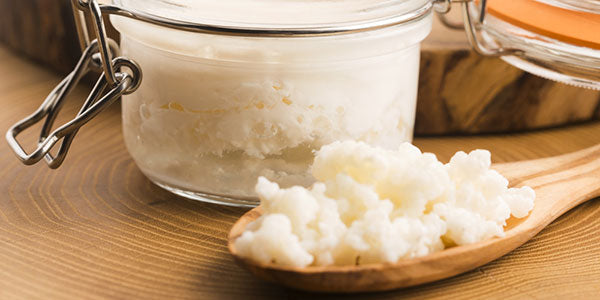
What is Kefir?
Kefir is a fermented milk drink produced with kefir "grains" - the essential key from separating it from standard milks. The kefir grains primarily consist of a SCOBY (an acronym for a symbiotic colony of bacteria and yeast) - a mixture of bacteria and yeast cultures and also the essential component differentiating kombucha from black tea. Common bacterium that comprise kefir includes B. lactis, Lb. lactis, S. florentinus, Lb. acidophilus, B. bacterium longum, Lb. casei, Lb. planatrum and B. bacterium breve. The SCOBY inoculates cow, sheep or goat milk and offers a refreshing, yet tart flavor similar to yogurt and transforms traditional milk into a highly beneficial, yet untraditional tasting drink.
Kefir Nutrition
The nutritional profile (pictured below) depicts an unsweetened, plain Kefir product. Common ingredients include pasteurized milk, pectin, vitamin D3 and A but will alter to reflect added sugars for sweetened flavors. Carbohydrate and sugar and content will also fluctuate according to the sweetened flavors of kefir. In addition to the macronutrients, kefir is a prominent source of calcium and vitamin D.
*Adapted from Lifeway's Low-Fat, Plain Kefir
6 Benefits of Kefir
1. Supports Bone Health
Despite the complexity of kefir, it is still valuable to go back to the basics of milk - offering natural sugar, protein and well-recognized calcium. Calcium paired with the commonly added vitamin D aids in the building and supporting of strong bones. Just one glass of kefir provides an average of 30 percent of daily calcium needs!
2. Promotes A Healthy Gut and Digestive System
Though bacteria can be harmful to health, kefir contains helpful bacteria. The probiotic content, or "good" bacteria, promotes a healthy gut and digestive system. Kefir has been used to relieve a wide variety of intestinal disorders and helps reduce flatulence and bloating.
3. Fosters A Strong Immune System
Probiotics are further valuable in supporting a strong immune system. Additionally, it is naturally gluten-free, making it friendly for those living with Celiac disease - an immune reaction to gluten that can cause extreme damage to the gastrointestinal lining following its intake.
4. Maintains and Grows Muscle
Kefir is power-packed with protein, the macronutrient primarily responsible for muscle stimulation. One cup naturally contains 11 grams of protein, making kefir a convenient post-workout drink.
5. Encourages Weight Loss and Maintenance
In addition to muscle growth, protein also supports a healthy weight. Diets high in protein provokes satiety, ultimately reducing the risk of overeating and cravings throughout the day.
6. Boosts Mood
Kefir also contains tryptophan, an amino acid known to be found in turkey. Tryptophan helps raise the levels of serotonin, a chemical in the brain responsible for mood balance.
How to Consume
Reaping the health benefits of kefir is not a tremendous feat, as it's widely available in most grocers. Like milk found in the refrigerated section, keeping it chilled is further necessary following its purchase. Once you get your hands on kefir, it can be consumed in various ways. Simply drink on its own or add to smoothies for a protein and probiotic source. It can be further substituted for buttermilk in products are used in marinades and dressings. But if cooking with kefir, use with caution, as it may curdle at high temperatures. Additional kefir goods include cheese, frozen yogurt and kefir products formulated for children.






